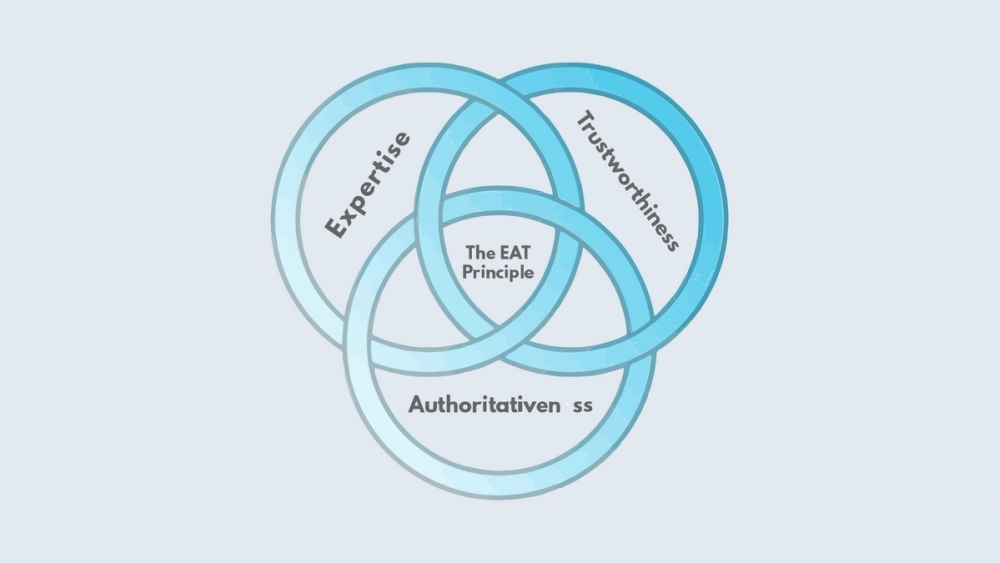EAT Principles in SEO: What Are They and How to Use Them?

The use of EAT principles in SEO helps companies to increase the position of the site in the SEARCH results, attract new customers and reach the target audience.
Sites that appear on the first page of search results should first and foremost be of high quality. Google employees follow the EAT principles when evaluating websites. What are these criteria and how to use them in Internet marketing?
What is the EAT principle in SEO?
The term EAT first appeared a couple of years ago in the recommendations for search quality evaluators. It is closely related to the assessment of the quality of the website and is based on three principles:
- Expertise (specialization). The content on the site should be developed based on the knowledge provided by experts and people who work closely with them.
- Credibility. Quality websites are websites that have significant trust in a particular area.
- A website can be rated well by a search engine if it inspires confidence in users.
It is worth reading the guidelines contained in the document published by Google (Guidelines for Evaluating Search Quality), because websites that work according to the EAT principle can rank higher in search results and attract significantly more users. Such optimized sites are usually attractive not only to specialists who evaluate them, but also to visitors.
YMYL: Your Money or Your Life
Sites known as YMYL ("Your Money or Your Life") must be of the highest quality. These are websites that can somehow influence the decisions made by users in their lives or affect the well-being of users.
This category of sites includes the following:
- Websites of state bodies.
- Sites offering legal advice.
- Sites focused on obtaining funding.
- Information portals that publish various content that relates to politics, economics or social issues and form people's opinions.
- Sites dedicated to health, diets, or the treatment of specific medical conditions.
- Online stores, in connection with the payment transactions performed.
Google employees pay a lot of attention to this type of sites, because false information on them can lead to various negative consequences, such as financial losses, deception and even a threat to health or life.
By using the EAT principle in search results, users can only see valuable websites that publish safe and useful content, not texts that mislead or encourage inappropriate behavior.
Answer the question: why are you creating a website?
If you want your site to be considered a high-quality site, first determine the purpose for which it was created. For example, help in learning to knit. The extent to which you manage to achieve a goal is an important criterion when evaluating a website and its compliance with the EAT principle.
You can focus on one main task or several smaller ones, but from the moment you point them out, you must consistently pursue the goal.
If your goal was to provide users with, for example, information about organic cosmetics, you should choose the right keywords and, in accordance with EAT guidelines, publish interesting content on the website showing how to use this type of products, their advantages and possible disadvantages.
Users who enter queries into the search engine are also guided by certain motives. A good website meets their needs, and the search engine's job is to find the best answers to the query and the specific keywords used.
Experience, credibility and reliability in practice
Expertise is one of the main principles of EAT. It implies the publication of materials created or verified by experts in this field. This applies to specialized websites, for example, describing the treatment of diseases or the legal principles of granting loans.
Google employees appreciate the professional knowledge passed on to users. Moreover, sometimes experts share information that has not previously been discussed on other websites and therefore has even greater practical value.
However, it should be noted that not all pages require expert texts. We're talking about websites that don't belong to the YMYL group, such as blogs written by enthusiasts of certain activities, or online forums.
The texts published there are often written by people who have experience in a particular field. Although such content is not signed by an expert, it is also considered valuable in the context of EAT. In this case, it is important to freely share knowledge and provide the user with effective advice, as well as verified and reliable information.
If you want to increase confidence in a specialist, it is worth posting a note about him on the site. It's also good to emphasize the education of the person creating the content by providing access to documents such as diplomas confirming education, awards received by him and certificates received. Moreover, if a specialist of a certain profession appears on the site, it is advisable to enter his name and surname so that users find his contacts in Google or in public registers.
Create quality content as part of EAT
If you want to get high marks in the EAT process, you also need to make sure that the content is interesting to people. Materials must meet the needs of the recipient. If it is a person who does not know a particular field, the expert should adapt his language to it so that the information provided is understandable to the reader.
When creating your content, do not forget to follow the rules of spelling and punctuation. Texts with gross errors can scare users away from re-visiting the site. It's also important to present complex things in a fun way – for example, with infographics.
Moreover, the main content of the site does not have to be purely textual. On some pages, this may be, for example, a film, a game or statements by the authors.
Regardless of the choice of the form of presentation of information, it should be borne in mind that the creation of valuable content that will be appreciated and in accordance with the principles of EAT requires a lot of time and effort.
Apart from the quality of the content, its length is also important in terms of EAT. It is impossible to determine the "ideal" number of characters to write an article or the number of minutes that the creators of the video must fit.
It is important that the topic is discussed in detail and that the published content answers the questions that concern users. In addition, when creating a site, it is worth spending time on additional graphic elements and the convenience of the interface, as this has a huge impact on the user experience and people's attitude to the site.
Factors that inspire confidence in the site
Trust is one of the fundamental principles of EAT, so you should win the trust of your readers in a variety of ways. In addition to the authors' presentation previously described, you should make sure that the people who create content on your website also speak at industry magazines or participate in conferences.
An important role is played by external links leading to the site. You need to make sure that links only appear on quality pages. Thanks to this, the site acquires authority.
If you want to meet the EAT criteria, you must purchase an SSL certificate that ensures the confidentiality of the information sent. This is especially important if some activities on the website require sensitive data.
If you want to meet the expectations of site visitors, you can create a subpage with frequently asked questions. When launching an online store, it is worth making sure that users have access to information regarding payment methods or delivery of goods.
What can reduce the quality of the site?
If you want to create a quality website and please Google, you should avoid actions that contradict the EAT principle. Among them, the following errors stand out:
- Copy content from other sites.
- Content creation by people who are not familiar with the field.
- Publication of low-quality content that is not useful.
- Placing a large number of advertisements that negatively affect the UX.
- Maintaining a website without a clearly defined purpose.
To avoid this type of mistake, entrust positioning to experienced professionals who know how to adapt to Google's algorithm.
Our team provides customers with valuable content and helps them build websites according to the EAT principle used by Google. Creating a quality website is one of the best ways to reach a specific audience and attract new customers.
